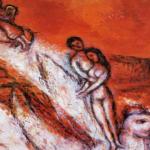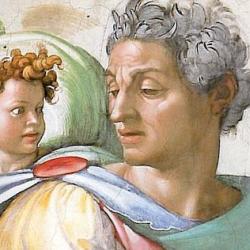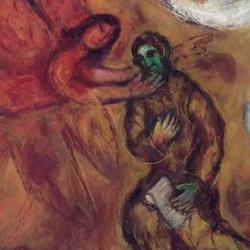Things are not as they should be, and Judah calls for Yahweh to descend to help. Rip the heavens, shake the earth, boil the sea; tear the three-story house of the universe apart brick by brick, but come down to help! (Isaiah 64).
Judah has come to acknowledge that she’s to blame for her own condition.
Verse 6 uses a series of comparisons (using the particle k- four times) that stress the universality of Israel’s predicament (kol, “all,” is used three times):
*All have become as an unclean one
*All righteousness is as filthy garment
*All wither like a leaf
*Iniquities/guilt carry us away like wind.
There seems to be a progression in the comparison. From admitting that she has become as unclean, Israel intensifies the comparison by comparing her righteousness (apparently, the Hebrew terms are rare) to a menstrual cloth. The result of uncleanness is withering; as the unclean people, Israel is drained of life. And, drained of life, she is like a dried leaf, like chaff that is blown away.
The final comparison, though, is surprising. Israel herself (“all of us”) is like a leaf, but what blows the dried leaf away is not the breath of the Spirit but the wind of Israel’s own guilt: “Our iniquities, like the wind, bear us away.” Verse 7 further stresses the power of Israel’s sin: Yahweh delivered Israel “in the hand of our guilt/iniquities.” Guilt/iniquity is portrayed here as a spiritual power, personified with breath and hand, a dominating tyrant over the people Israel. No wonder she asks plaintively, “Shall we be saved?” (v. 5).
She has not only sinned, but sinned for a long time, sinned so often that her sin has become habitual, a second nature, a clothing that fits as closely as her own skin. She has become repulsive, an unclean thing. Her righteousness is supposed to be a garment, but one of glorious luminosity. Instead, her righteousness is a defiled garment, as polluted as a menstrual cloth, one of the most intensively defiled and defiling things an Israelite can image. Her bloody garments don’t cover her impurity but display it.
(N.B. Isaiah’s description of Judah’s righteousness in these revolting terms is not a statement about human depravity generally. Humans are depraved, infected with sin in every respect. But the actions of sinful human beings as such aren’t tampons. They become defiled by long persistent impenitence.)
The references to garments, leaves, and wind (ruach, also “spirit”) puts us in the garden. Israel has become a new Adam, whose garments do not cover in the presence of the “Spirit” of the day (Genesis 3).
It’s the garden all over again. Judah is like leaves, fig leaves, withered fig leaves that will be blown away by the Spirit-wind of the day. Her leaves don’t hide her, rather Yahweh hides from her, and she cannot find or take hold of Him. The city and the house, once beautiful as a garden, has become a wilderness.
Still she has hope. No matter she’s withered; no matter she’s impure; no matter she’s ruined and trampled and shattered; no matter how hidden Yahweh has become, she can still call to Him, and she has a trump card: She can call to Him as Father.
For Yahweh has made Israel, Yahweh has made Israel His, identified Himself with Israel by taking her name (God of Israel) and finally by taking her flesh. The God who formed Judah as a potter forms a pot, as Yahweh made Adam, can remake Judah. The Father who made Judah can remake her, mold her again into a vessel, breathe again the breath of life, robe her yet again in robes of righteousness and glory.
Isaiah anticipates Paul’s plea at the end of Romans 7: Who shall save us from the body of this death? Flesh cannot; the law cannot, neutralized through flesh; only the ruach of Yahweh has the power to regather what the ruach of iniquity scatters. Only the hand of the potter whose hands made His people can deliver from the powerful hand of guilt (v. 8).











